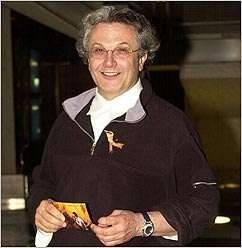George Miller - Prescriptions for a regenerated Australian Film Industry, 2003

Doctor's script for film recovery
November 17, 2003
Australia's film industry is not in terminal decline but it needs urgent treatment, George Miller tells Garry Maddox.
A more aggressive approach to film financing, more creative training, more emphasis on film culture and slowing the erosion of Australia's identity.
If Dr George Miller was diagnosing the Australian film industry, these would be part of his presciption. The influential filmmaker, whose medical shifts helped support him and his late partner Byron Kennedy while making the first Mad Max movie, has made a rare assessment of the industry ahead of the Australian Film Institute awards on Friday.
As befitting one of the country's most successful directors and producers, Miller's comments are insightful and thoughtful rather than just an appeal for more government funding.
Asked about the tough year for the industry, the three-time Oscar nominee said the problems were very deep. "I really feel we're fiddling while Rome burns," he said before detailing the issues facing the country's filmmakers in competing with the world's best.
It was no accident, for instance, that America dominated the film business. "They understand how important it is to push their culture through the moving image culture. We don't really understand that very much."
A major issue was that Australia was exporting its talent but not its stories any more. Many Asian countries were having an impact through the Bollywood, Japanese anime and kung-fu influences on mainstream cinema.
"They are exporting in many ways their culture. Australia seems to have stopped doing that, probably from about the early '90s," he said.
So does it come down to more funding?
Miller, whose credits include the three Mad Max films, The Dismissal, The Witches of Eastwick, Lorenzo's Oil and Babe: Pig in the City, said many factors were affecting the patient's condition. The level of government funding was one; another was the approach to filmmaking.
"I think it needs a much much more aggressive approach to funding of films," he said, adding that only a narrow range of budgets was being financed by government bodies.
"People say the screenplays aren't good enough. Well, there are no good screenplays anywhere to be honest. Most films made in Hollywood don't have good screenplays."
Miller said there was not an aggressive enough approach to creativity either. "It's one-off talents - like the Fijian rugby team. You have players of genius but the basic infrastructure to train them [is not there].
"I'm not talking about the technical training - we're very resourceful and very gifted technically. I'm talking about the creative training."
There was also little serious discourse about filmmaking and culture in Australia.
When he first met the American filmmakers who had a huge impact on cinema in the '70s and '80s, Miller was "blown away" by their encyclopedic knowledge of cinema and culture in general.
"I realised just how far behind we were. So it's not by accident that they're very gifted manipulators of film language because they're so highly cultured. We have to work that much harder to actually find our own way, find our own particular point of view.
"But the big problem is we're eroding our culture and we're becoming less and less like Australians and more and more like a kind of American ... There's nothing to differentiate us from anybody else."
Miller said fellow filmmaker Peter Weir had an apt phrase for what was required to tell stories through moving images - creative gymnasia.
"There are no creative gymnasia in this country. We've got a lot of technical gymnasia but we don't have the creative gymnasia."
Miller is midway through filming the computer-generated Happy Feet, a penguin tale which features the voices of Robin Williams, Brittany Murphy and Elijah Wood, in Sydney.
Confirming his plan to make a fourth Mad Max after finishing Happy Feet, Miller said the rising value of the Australian dollar would affect the budget.
"When we started on Mad Max, the Australia dollar was 52 [US cents] ... It's 72 cents now.
"That's a massive blow-out in your budget, which is another problem for Australia.
"I'm all for the runaway productions coming out from the United States. I love the fact that we get the Matrix movies and Star Wars being made here. But the Australian dollar [is] making the differential so tough."
Miller predicted that the value of the dollar would see more runaway productions going to other English-speaking countries, including South Africa, New Zealand and Canada.
Apart from his creative influence, Miller's contribution to the industry includes 20 years of the Byron Kennedy award.
Recognising innovation and excellence, it has gone to such well-known names as Jane Campion, Baz Luhrmann, Catherine Martin and John Hargreaves as well as lesser known talents in fields as varied as screenwriting (Laura Jones), animal training (Evonne Chesson), casting (Alison Barrett), sound (Roger Savage), new media (Gary Warner) and film colour grading (Arthur Cambridge).
As well as being like a brother, Miller said, Kennedy was a film-making visionary.
"To be lost to the world at such a young age is a pity because he was really innovative technically. Yet he never saw a fax machine, email, digital filmmaking or digital editing."
http://www.acmi.net.au/F676607142434DCFB80F629BF859AC52.js